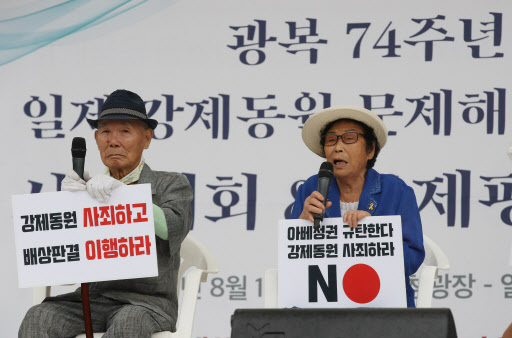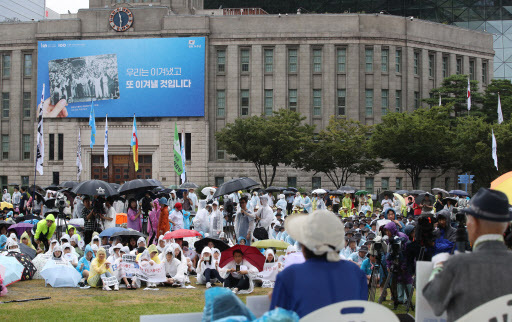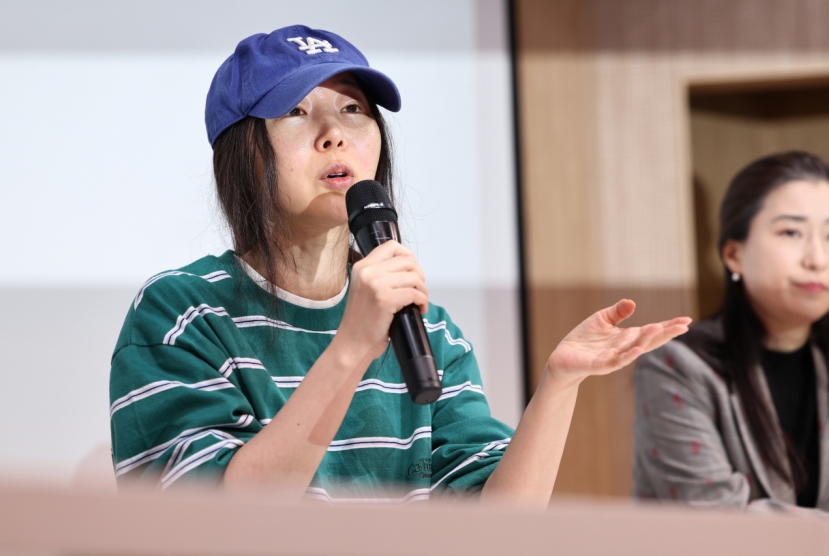[From the scene] Anti-Abe rallies dominate central Seoul on Liberation Day
By Ock Hyun-juPublished : Aug. 15, 2019 - 16:46
Thousands of citizens from South Korea and Japan on Thursday urged the Shinzo Abe administration to apologize to Korean victims forced to work for Japanese occupiers during a rally in central Seoul, marking the 74th anniversary of Korea’s liberation from Japan.

Despite heavy rain, an estimated 3,000 people gathered at Seoul Plaza to denounce the Abe administration for failing to admit to its past wrongdoings during its 1910-45 colonialization of Korea as historical issues are still haunting relations between the neighboring countries.
The participants chanted: “We are the witnesses of history. Apologize for forcing (Koreans) into labor!”
Seventy-four years on, Korean victims forced to work at Japanese factories labor during World War II are still seeking a formal apology and reparations from the Japanese government.
“When we came back from the toilet late, they (Japanese managers) used to kick and beat us,” said Yang Geum-deok, 90, a surviving victim who was conscripted as forced labor for Mitsubishi Heavy Industries in 1944 when she was only 13 years old.
“The whole world is aware of how much we suffered from working (in Japan) so it is my only wish to receive an apology from Abe before I die,” she said onstage at the rally organized by an association of 18 civic groups.
Another victim Lee Chun-sik, 95, was also present at the rally.
“I have much to say, but I can’t speak much as I’m getting choked up ... sorry,” he said.

Bilateral relations have been at their lowest level in recent weeks after rulings by Korea’s Supreme Court last year that ordered Japanese companies to compensate Koreans forced into labor. Tokyo says the matter was settled by the 1965 treaty normalizing bilateral ties.
In an apparent act of retaliation, Japan tightened restrictions on exports to Korea of three key materials necessary for the production of memory chips and displays, and removed Korea from its whitelist of trusted trading partners.
Japanese civic groups also attended the rally to stand in solidarity with the Korean victims.
“The Korean government asked for dialogue, but Japanese government is dragging a trade issue into this, showing a behavior that does not makes sense and an attitude that is abnormal,” Yoshikazu Odagawa, president of Japan’s National Confederation of Trade Unions, said during the rally. “For Abe to fix his wrong perception of history, we will continue to fight with Korean civic groups in solidarity.”
Among the participants were some Japanese students keen to learn more about how Koreans view the neighbors’ shared history amid intensifying anti-Japanese sentiments here.
“In Japan, not many people know about the issues (of comfort women and forced laborers.) I think Japanese should also take an interest in the issue as much as Koreans do,” said Shuhei Inomata, a Japanese citizen who has studied in Korea since last August. “I think the Japanese government needs to apologize, and make a forward-looking promise so that Korea-Japan relations can get better.”
The issue of comfort women -- a euphemism for girls and women who were forced to provide sexual services to the Japanese Imperial Army -- has also been a key source of diplomatic tensions between the neighboring countries.
Korea and Japan signed a deal in 2015 in which Japan apologized to the victims and provided 1 billion yen ($9.40 million) for a foundation to support the victims. Some of the victims, however, protested the deal, leading the Moon Jae-in administration to order a dissolution of the foundation.
For him, it is painful to see the ongoing boycott of Japanese services and products among Koreans enraged by the Abe administration’s recent trade decisions.
“I don’t feel Koreans hate Japanese. They hate the Japanese government. Japanese people also don’t have bad feelings about Koreans,” he said.
Many young Koreans were also at the rally to show their determination not to forget about the pain Koreans went through under Japan’s illegal occupation of the peninsula.
“I came here to support former comfort women and forced laborers who are yet to be truly liberated from Japanese colonial rule,” said Nam Dal-li, a 21-year-old university student. “The Japanese government should reveal what really had happened, compensate and apologize to the victims.”
Following the rally, the victims and rally participants marched about 1.6 kilometers from Seoul Plaza to the Japanese Embassy. Accompanying them were the portraits of the victims who passed away during protracted court proceedings for their case.
At Gwanghwamun Square, some 5,000 members of the Korean Confederation of Trade Unions, Korea’s second largest umbrella labor union, staged a separate rally, accusing the Abe government of criticizing its pursuit of heavier military armament.
“Japan’s Abe government is focusing on whitewashing (past wartime crimes) and economic invasion rather than apologizing for them,” KCTU chairman Kim Myung-hwan said at the rally.
In the evening, a candlelight vigil was held at Gwanghwamun Square to condemn the Abe administration. The rally organizers called on Koreans to join the boycott of Japanese products and demanded an end of South Korea-Japan defense intelligence-sharing agreement.
(laeticia.ock@heraldcorp.com)
In an apparent act of retaliation, Japan tightened restrictions on exports to Korea of three key materials necessary for the production of memory chips and displays, and removed Korea from its whitelist of trusted trading partners.
Japanese civic groups also attended the rally to stand in solidarity with the Korean victims.
“The Korean government asked for dialogue, but Japanese government is dragging a trade issue into this, showing a behavior that does not makes sense and an attitude that is abnormal,” Yoshikazu Odagawa, president of Japan’s National Confederation of Trade Unions, said during the rally. “For Abe to fix his wrong perception of history, we will continue to fight with Korean civic groups in solidarity.”
Among the participants were some Japanese students keen to learn more about how Koreans view the neighbors’ shared history amid intensifying anti-Japanese sentiments here.
“In Japan, not many people know about the issues (of comfort women and forced laborers.) I think Japanese should also take an interest in the issue as much as Koreans do,” said Shuhei Inomata, a Japanese citizen who has studied in Korea since last August. “I think the Japanese government needs to apologize, and make a forward-looking promise so that Korea-Japan relations can get better.”
The issue of comfort women -- a euphemism for girls and women who were forced to provide sexual services to the Japanese Imperial Army -- has also been a key source of diplomatic tensions between the neighboring countries.
Korea and Japan signed a deal in 2015 in which Japan apologized to the victims and provided 1 billion yen ($9.40 million) for a foundation to support the victims. Some of the victims, however, protested the deal, leading the Moon Jae-in administration to order a dissolution of the foundation.
For him, it is painful to see the ongoing boycott of Japanese services and products among Koreans enraged by the Abe administration’s recent trade decisions.
“I don’t feel Koreans hate Japanese. They hate the Japanese government. Japanese people also don’t have bad feelings about Koreans,” he said.
Many young Koreans were also at the rally to show their determination not to forget about the pain Koreans went through under Japan’s illegal occupation of the peninsula.
“I came here to support former comfort women and forced laborers who are yet to be truly liberated from Japanese colonial rule,” said Nam Dal-li, a 21-year-old university student. “The Japanese government should reveal what really had happened, compensate and apologize to the victims.”
Following the rally, the victims and rally participants marched about 1.6 kilometers from Seoul Plaza to the Japanese Embassy. Accompanying them were the portraits of the victims who passed away during protracted court proceedings for their case.
At Gwanghwamun Square, some 5,000 members of the Korean Confederation of Trade Unions, Korea’s second largest umbrella labor union, staged a separate rally, accusing the Abe government of criticizing its pursuit of heavier military armament.
“Japan’s Abe government is focusing on whitewashing (past wartime crimes) and economic invasion rather than apologizing for them,” KCTU chairman Kim Myung-hwan said at the rally.
In the evening, a candlelight vigil was held at Gwanghwamun Square to condemn the Abe administration. The rally organizers called on Koreans to join the boycott of Japanese products and demanded an end of South Korea-Japan defense intelligence-sharing agreement.
(laeticia.ock@heraldcorp.com)
-
Articles by Ock Hyun-ju



![[Herald Interview] 'Amid aging population, Korea to invite more young professionals from overseas'](http://res.heraldm.com/phpwas/restmb_idxmake.php?idx=644&simg=/content/image/2024/04/24/20240424050844_0.jpg&u=20240424200058)
















